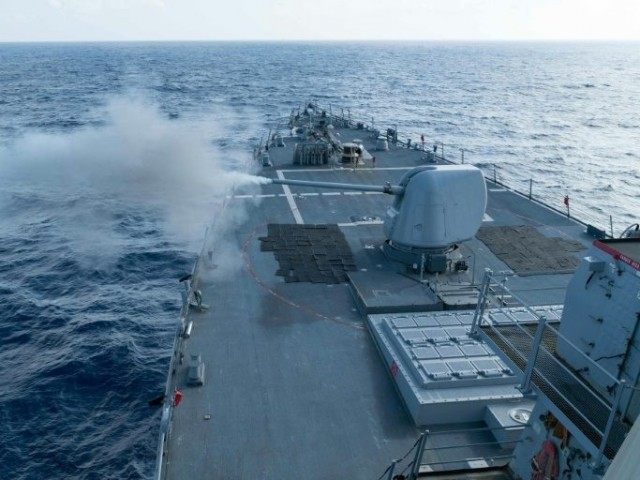Admiral Harry Harris, the commander of the U.S. Pacific Command, said Wednesday the Navy plans to expand the frequency and variety of freedom of navigation operations in the South China Sea, following reports that Beijing has escalated its militarization of islands and reefs in disputed territory in the region.
“We’ll be doing them more and we’ll be doing them with greater complexity in the future,” Admiral Harris told legislators, adding what has become America’s mantra on the South China Sea: “We’ll fly, sail and operate wherever international law allows.” He accused China of “clearly militarizing” the sea, despite claims by the Chinese government that it is the United States, in operating in the region at all, that is escalating military tensions in the area. “China’s intent to militarize the South China Sea is as certain as a traffic jam in DC,” Harris joked.
Harris echoed statements he made in early February, when he asserted that, “as we continue down the path of freedom of navigations, you will see more of them, and you will see them increasing in complexity and scope in areas of challenge.” The Chinese government claims most of the South China Sea, a claim supported by no relevant international law and disputed by most neighbors in the region: Taiwan, Brunei, Malaysia, Vietnam, and the Philippines.
In the past month, the Chinese government has begun constructing an advanced radar system in the Spratly Islands, claimed by the Philippines, and has placed both surface-to-air missiles and fighter jets in the Paracel Islands, claimed by Vietnam.
“The United States is the real promoter of the militarization of the South China Sea,” defense ministry spokesman Wu Qian said Thursday in response to Admiral Harris’s comments, adding, “China’s construction of military facilities on the islands and reefs of the South China Sea is really needed.” Wu added that the Chinese government had a right to establish an Air Defense Identification Zone (ADIZ) in the South China Sea, which would force all aircraft in the region to request permission from China before traveling through, but Beijing had no plans of establishing such a zone soon. Wu accused the international community of “double standards” for condemning China’s militarization in the region, adding extra condemnation against the United States for causing a “brouhaha” about the issue.
In addition to the Chinese government’s accusations against the United States, Foreign Ministry spokeswoman Hua Chunying issued a statement attacking the Australian government on Thursday, which has also called for China to cease its construction of artificial islands and military facilities in the region. Citing a white paper released by the Australian government warning China against its projects in the region, Hua called the paper’s remarks “negative” and asserted China was “dissatisfied” with the report.
While the Chinese Foreign Ministry continues issuing reports condemning anyone who questions Chinese hegemony in the region, Chinese Foreign Minister Wang Yi is soon to complete a trip to Washington, during which he asserted before Secretary of State John Kerry that the entire region is “ours since ancient times” and China has no intention of abandoning its projects there. Wang also used the trip to demand that the United States end its negotiations with South Korea over an advance missile system Seoul is seeking to protect against increased belligerence from North Korea. “We believe that China’s legitimate security concerns must be taken into account and a convincing explanation must be provided to China,” he said of the missile negotiations.

COMMENTS
Please let us know if you're having issues with commenting.